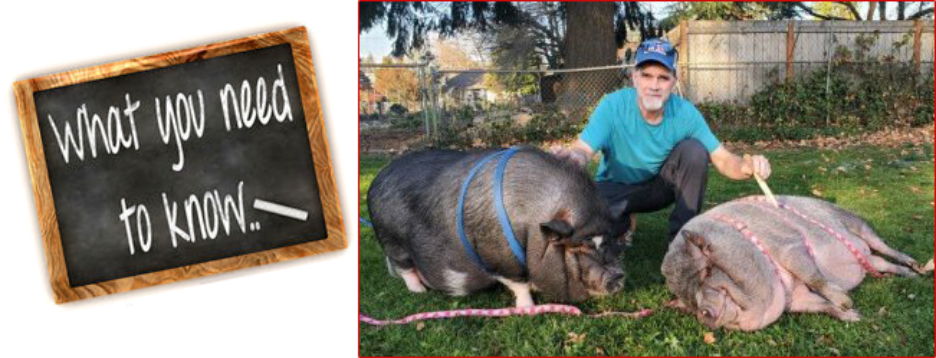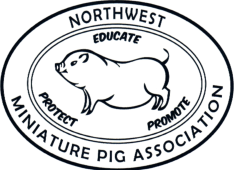
Pig Info
About Potbellied Pigs
Potbellied pigs are clean, intelligent, affectionate creatures. Pigs are the fourth smartest animal group on the
planet, following only humans, apes and chimps, whales and dolphins. Their intelligence, curiosity and charm
make them appealing, but it may also make them a challenging pet. Pigs have special needs. They make
wonderful pets for those people who understand their special needs and are willing to educate themselves and
meet those needs. They require extra patience and perseverance, but it is more than made up for by their
wonderful personalities!
Want Some Basic Facts?
Download our Fact Sheet about potbellied pigs, with all the info you'll need!
DOWNLOAD OR VIEW PATTY HILL’S NEW POTBELLIED PIG INFORMATIONAL BOOKLET (Version June 2025 - 37
PAGES)!
Thinking About Adding A Miniature Pig To Your Family? The top questions about Potbellied
Pigs:
1.
WHAT DO THEY EAT? There are special feeds specifically developed for potbellied pigs. They also enjoy
fresh fruits and vegetables (beware of some seeds). Potbellied pigs must be fed twice a day and need to have
water always available. Avoid giving table scraps which can cause obesity or other health problems.
2.
Do They Get Along With Dogs and Cats? Potbellied pigs usually get along very well with dogs and cats.
The main exception is with dogs that are too aggressive and chase or attack the pig.
3.
How Big Do They Get? Size is determined by genetics. There are different miniature pig bloodlines and
some pet pigs may have a farm hog among their ancestors. A pig weighs much more than a dog that appears
to be the same size. Look at the parents to get a better idea of the future size of the offspring. The adults'
age should also be considered. A sow can have her first litter before she is 8 months old. Potbellied pigs don't
get their full growth until about 3-4 years of age. Large parents usually (but not always) mean the piglets will
grow to be large.
4.
Are They Really Smart? Yes. Pet pigs learn much by simple observation, but they can learn both good and
bad behaviors. If you let your piggy know where the food is kept, he may learn to open the cupboard or
refrigerator by himself. Some wipe their feet at the door; one answers the phone when no one else does.
Some pets have been taught more than thirty tricks. The keys to success in training are patience,
persistence and common sense. If you lack any of these keys, you may want to consider a different pet.
5.
Can They Be Housebroken? Yes. Potbellied pigs are relatively clean animals. In fact, most will housebreak
themselves. They prefer to go potty either outside or in a litter box. However, if the location chosen is not
kept clean, the pet pig will move to another area.
6.
Where Do I Buy One? It is best to buy from a reputable breeder, one who sells registered potbellied pigs
that are guaranteed to be healthy, current on inoculations, and spayed or neutered. You may want to
consider adopting a previously owned pig (see question nine).
7.
Is Help Available For New Owners? Yes. The Northwest Miniature Pig Association has an active
membership that works hard to gather available information about potbellied pigs. Members are eager to
share their experiences and knowledge about the care of pet pigs, including suggested veterinarians who
specialize in potbellied pigs. Also, the NWMPA publishes a newsletter; titled PIG TALES to help keep its
members informed about club events and general pet pig knowledge.
8.
Am I Ready For A Long Term Commitment? Be sure you are ready for the long term commitment. Raising a
potbellied pig is similar to raising a child. If you take on the commitment of a piglet, remember it will grow
and will continue to need your love and attention. The average lifespan of a healthy potbellied pig is
typically between 12-18 years.
9.
Are There Adoptable Pigs That Need Homes? There are several NWMPA members who care for foster pigs
in need of adoption. Unfortunately, most have been rescued because someone was not ready for the long
term commitment of raising a potbellied pig.
10.
Teacup Pigs? Is there such a thing? Are you considering purchasing a "Teacup Pig"? A "Dandie" Pig? A
Potbelly Pig? A "miniature" or "pocket" pig? Are they all the same pet? Are they all the same pig? YES, THEY
ARE! The term "Teacup" refers to the SIZE of the pig, NOT the type of pig!
Can you reduce the size of an animal by inbreeding the smallest of the smallest in a litter? By starving it?
YES, YOU CAN! If you starved your child, you would eventually stunt their growth! Is it worth the health
problems down the road? Is it worth a shorter life span of your pet pig? NO, IT IS NOT! Would you do that to
your own child? Then why do it to an animal? Pigs can be between 12 to 18 year commitment... are you
prepared for the massive health issues and vet expenses that comes with altering the size of your pet?
Please check back frequently as we build the facts and the fiction! If you are expecting to give up your pig
if it gets too large or weighs too much, ASK THE BREEDER: Will you take back this pig should it become 100 or
even 200 pounds? If they say no, DON'T BUY! Are you invited into their home to see the pig parents and
babies interact? Can they provide proof of the age of the parent pigs? If not, they are not a reputable
breeder! Do breeders sell sick, wormy piglets as "teacup" pigs? Yes! And as soon as they are brought back to
health and put on a proper diet, they become regular sized potbellied pigs! Sanctuaries are overflowing with
teacup pigs that could've, should've, would've, but didn't and all because size was of the utmost importance!
If size is what you are looking for, a pig may not be right for you! No matter what the size, a pig is a pig and
needs outside time! Time to root, time to dig, time to be a regular pig! There are almost no pigs, large or
small, that can live in a condo or home where there is no yard! If you provide for the specialized needs of
your pig, you and your pig will live a long, happy life!
Thank you for checking back frequently while we gather and add information that can give you a clear
understanding of pigs as pets before you purchase or perhaps adopt that special pig pet.
Please be sure to read the articles on this Teacup Pig Info webpage.
11. Is It Necessary To Spay/Neuter? Yes! Potbellied pigs mature sexually as early as 8 weeks. An un-neutered
male has an unpleasant odor and will try to ride your leg or the furniture. A neutered male will lose this odor
and offensive behavior. Unspayed females have a heat cycle every 21 days which lasts from 5 to 7 days. They
may jump on you, whine for hours, and forget their potty training. A spayed female will not behave this way.
Many pet pigs are given up because of behaviors resulting from not being spayed or neutered.
Want and need more information?
Contact NWMPA members or click on the links below, provided to you by the North American Potbellied Pig
Association (NAPPA).
•
Discipline
•
Living Accommodations and Grooming
•
Nutrition
•
Summer Safety
•
Winter Safety
•
Veterinarian Care
BACK TO TOP


Pig Info
About Potbellied Pigs
Potbellied pigs are clean, intelligent,
affectionate creatures. Pigs are the fourth
smartest animal group on the planet, following
only humans, apes and chimps, whales and
dolphins. Their intelligence, curiosity and
charm make them appealing, but it may also
make them a challenging pet. Pigs have special
needs. They make wonderful pets for those
people who understand their special needs and
are willing to educate themselves and meet
those needs. They require extra patience and
perseverance, but it is more than made up for
by their wonderful personalities!
Want Some Basic Facts?
Download our Fact Sheet about potbellied
pigs, with all the info you'll need!
DOWNLOAD OR VIEW PATTY HILL’S NEW
POTBELLIED PIG INFORMATIONAL BOOKLET
(Version June 2025 - 37 PAGES)!
Thinking About Adding A Miniature Pig
To Your Family? The top questions
about Potbellied Pigs:
1.
WHAT DO THEY EAT? There are special
feeds specifically developed for potbellied
pigs. They also enjoy fresh fruits and
vegetables (beware of some seeds).
Potbellied pigs must be fed twice a day and
need to have water always available. Avoid
giving table scraps which can cause obesity
or other health problems.
2.
Do They Get Along With Dogs and Cats?
Potbellied pigs usually get along very well
with dogs and cats. The main exception is
with dogs that are too aggressive and chase
or attack the pig.
3.
How Big Do They Get? Size is determined
by genetics. There are different miniature
pig bloodlines and some pet pigs may have
a farm hog among their ancestors. A pig
weighs much more than a dog that appears
to be the same size. Look at the parents to
get a better idea of the future size of the
offspring. The adults' age should also be
considered. A sow can have her first litter
before she is 8 months old. Potbellied pigs
don't get their full growth until about 3-
4 years of age. Large parents usually (but
not always) mean the piglets will grow to
be large.
4.
Are They Really Smart? Yes. Pet pigs
learn much by simple observation, but they
can learn both good and bad behaviors. If
you let your piggy know where the food is
kept, he may learn to open the cupboard or
refrigerator by himself. Some wipe their
feet at the door; one answers the phone
when no one else does. Some pets have
been taught more than thirty tricks. The
keys to success in training are patience,
persistence and common sense. If you lack
any of these keys, you may want to
consider a different pet.
5.
Can They Be Housebroken? Yes.
Potbellied pigs are relatively clean animals.
In fact, most will housebreak themselves.
They prefer to go potty either outside or in
a litter box. However, if the location
chosen is not kept clean, the pet pig will
move to another area.
6.
Where Do I Buy One? It is best to buy
from a reputable breeder, one who sells
registered potbellied pigs that are
guaranteed to be healthy, current on
inoculations, and spayed or neutered. You
may want to consider adopting a previously
owned pig (see question nine).
7.
Is Help Available For New Owners? Yes.
The Northwest Miniature Pig Association
has an active membership that works hard
to gather available information about
potbellied pigs. Members are eager to share
their experiences and knowledge about the
care of pet pigs, including suggested
veterinarians who specialize in potbellied
pigs. Also, the NWMPA publishes a
newsletter; titled PIG TALES to help keep
its members informed about club events
and general pet pig knowledge.
8.
Am I Ready For A Long Term
Commitment? Be sure you are ready for
the long term commitment. Raising a
potbellied pig is similar to raising a child. If
you take on the commitment of a piglet,
remember it will grow and will continue to
need your love and attention. The average
lifespan of a healthy potbellied pig is
typically between 12-18 years.
9.
Are There Adoptable Pigs That Need
Homes? There are several NWMPA
members who care for foster pigs in need
of adoption. Unfortunately, most have been
rescued because someone was not ready
for the long term commitment of raising a
potbellied pig.
10.
Teacup Pigs? Is there such a thing? Are
you considering purchasing a "Teacup Pig"?
A "Dandie" Pig? A Potbelly Pig? A "miniature"
or "pocket" pig? Are they all the same pet?
Are they all the same pig? YES, THEY
ARE! The term "Teacup" refers to the SIZE
of the pig, NOT the type of pig!
Can you reduce the size of an animal by
inbreeding the smallest of the smallest in a
litter? By starving it? YES, YOU CAN! If you
starved your child, you would eventually
stunt their growth! Is it worth the health
problems down the road? Is it worth a
shorter life span of your pet pig? NO, IT IS
NOT! Would you do that to your own child?
Then why do it to an animal? Pigs can be
between 12 to 18 year commitment... are
you prepared for the massive health issues
and vet expenses that comes with altering
the size of your pet?
Please check back frequently as we build
the facts and the fiction! If you are
expecting to give up your pig if it gets too
large or weighs too much, ASK THE
BREEDER: Will you take back this pig should
it become 100 or even 200 pounds? If they
say no, DON'T BUY! Are you invited into
their home to see the pig parents and babies
interact? Can they provide proof of the age
of the parent pigs? If not, they are not a
reputable breeder! Do breeders sell sick,
wormy piglets as "teacup" pigs? Yes! And as
soon as they are brought back to health and
put on a proper diet, they become regular
sized potbellied pigs! Sanctuaries are
overflowing with teacup pigs that could've,
should've, would've, but didn't and all
because size was of the utmost importance!
If size is what you are looking for, a pig may
not be right for you! No matter what the
size, a pig is a pig and needs outside time!
Time to root, time to dig, time to be a
regular pig! There are almost no pigs, large
or small, that can live in a condo or home
where there is no yard! If you provide for
the specialized needs of your pig, you and
your pig will live a long, happy life!
Thank you for checking back frequently
while we gather and add information that
can give you a clear understanding of pigs as
pets before you purchase or perhaps adopt
that special pig pet.
Please be sure to read the articles on this
Teacup Pig Info webpage.
11. Is It Necessary To Spay/Neuter? Yes!
Potbellied pigs mature sexually as early as 8
weeks. An un-neutered male has an
unpleasant odor and will try to ride your leg
or the furniture. A neutered male will lose
this odor and offensive behavior. Unspayed
females have a heat cycle every 21 days
which lasts from 5 to 7 days. They may jump
on you, whine for hours, and forget their
potty training. A spayed female will not
behave this way. Many pet pigs are given up
because of behaviors resulting from not
being spayed or neutered.
Want and need more information?
Contact NWMPA members or click on the links
below, provided to you by the North American
Potbellied Pig Association (NAPPA).
•
Discipline
•
Living Accommodations and Grooming
•
Nutrition
•
Summer Safety
•
Winter Safety
•
Veterinarian Care
BACK TO TOP



Pig Info
About Potbellied Pigs
Potbellied pigs are clean, intelligent, affectionate creatures. Pigs are the
fourth smartest animal group on the planet, following only humans, apes
and chimps, whales and dolphins. Their intelligence, curiosity and charm
make them appealing, but it may also make them a challenging pet. Pigs
have special needs. They make wonderful pets for those people who
understand their special needs and are willing to educate themselves and
meet those needs. They require extra patience and perseverance, but it is
more than made up for by their wonderful personalities!
Want Some Basic Facts?
Download our Fact Sheet about potbellied pigs, with all the info you'll
need!
DOWNLOAD OR VIEW PATTY HILL’S NEW POTBELLIED PIG INFORMATIONAL
BOOKLET (Version June 2025 - 37 PAGES)!
Thinking About Adding A Miniature Pig To Your Family? The
top questions about Potbellied Pigs:
1.
WHAT DO THEY EAT? There are special feeds specifically developed
for potbellied pigs. They also enjoy fresh fruits and vegetables
(beware of some seeds). Potbellied pigs must be fed twice a day and
need to have water always available. Avoid giving table scraps which
can cause obesity or other health problems.
2.
Do They Get Along With Dogs and Cats? Potbellied pigs usually get
along very well with dogs and cats. The main exception is with dogs
that are too aggressive and chase or attack the pig.
3.
How Big Do They Get? Size is determined by genetics. There are
different miniature pig bloodlines and some pet pigs may have a farm
hog among their ancestors. A pig weighs much more than a dog that
appears to be the same size. Look at the parents to get a better idea
of the future size of the offspring. The adults' age should also be
considered. A sow can have her first litter before she is 8 months old.
Potbellied pigs don't get their full growth until about 3-4 years of age.
Large parents usually (but not always) mean the piglets will grow to be
large.
4.
Are They Really Smart? Yes. Pet pigs learn much by simple
observation, but they can learn both good and bad behaviors. If you
let your piggy know where the food is kept, he may learn to open the
cupboard or refrigerator by himself. Some wipe their feet at the door;
one answers the phone when no one else does. Some pets have been
taught more than thirty tricks. The keys to success in training are
patience, persistence and common sense. If you lack any of these
keys, you may want to consider a different pet.
5.
Can They Be Housebroken? Yes. Potbellied pigs are relatively clean
animals. In fact, most will housebreak themselves. They prefer to go
potty either outside or in a litter box. However, if the location chosen
is not kept clean, the pet pig will move to another area.
6.
Where Do I Buy One? It is best to buy from a reputable breeder, one
who sells registered potbellied pigs that are guaranteed to be healthy,
current on inoculations, and spayed or neutered. You may want to
consider adopting a previously owned pig (see question nine).
7.
Is Help Available For New Owners? Yes. The Northwest Miniature
Pig Association has an active membership that works hard to gather
available information about potbellied pigs. Members are eager to
share their experiences and knowledge about the care of pet pigs,
including suggested veterinarians who specialize in potbellied pigs.
Also, the NWMPA publishes a newsletter; titled PIG TALES to help keep
its members informed about club events and general pet pig
knowledge.
8.
Am I Ready For A Long Term Commitment? Be sure you are ready
for the long term commitment. Raising a potbellied pig is similar to
raising a child. If you take on the commitment of a piglet, remember it
will grow and will continue to need your love and attention. The
average lifespan of a healthy potbellied pig is typically between 12-18
years.
9.
Are There Adoptable Pigs That Need Homes? There are several
NWMPA members who care for foster pigs in need of adoption.
Unfortunately, most have been rescued because someone was not
ready for the long term commitment of raising a potbellied pig.
10.
Teacup Pigs? Is there such a thing? Are you considering purchasing
a "Teacup Pig"? A "Dandie" Pig? A Potbelly Pig? A "miniature" or "pocket"
pig? Are they all the same pet? Are they all the same pig? YES, THEY
ARE! The term "Teacup" refers to the SIZE of the pig, NOT the type of
pig!
Can you reduce the size of an animal by inbreeding the smallest of
the smallest in a litter? By starving it? YES, YOU CAN! If you starved
your child, you would eventually stunt their growth! Is it worth the
health problems down the road? Is it worth a shorter life span of your
pet pig? NO, IT IS NOT! Would you do that to your own child? Then why
do it to an animal? Pigs can be between 12 to 18 year commitment...
are you prepared for the massive health issues and vet expenses that
comes with altering the size of your pet?
Please check back frequently as we build the facts and the fiction! If
you are expecting to give up your pig if it gets too large or weighs too
much, ASK THE BREEDER: Will you take back this pig should it become
100 or even 200 pounds? If they say no, DON'T BUY! Are you invited
into their home to see the pig parents and babies interact? Can they
provide proof of the age of the parent pigs? If not, they are not a
reputable breeder! Do breeders sell sick, wormy piglets as "teacup"
pigs? Yes! And as soon as they are brought back to health and put on a
proper diet, they become regular sized potbellied pigs! Sanctuaries are
overflowing with teacup pigs that could've, should've, would've, but
didn't and all because size was of the utmost importance! If size is what
you are looking for, a pig may not be right for you! No matter what the
size, a pig is a pig and needs outside time! Time to root, time to dig,
time to be a regular pig! There are almost no pigs, large or small, that
can live in a condo or home where there is no yard! If you provide for
the specialized needs of your pig, you and your pig will live a long,
happy life!
Thank you for checking back frequently while we gather and add
information that can give you a clear understanding of pigs as pets
before you purchase or perhaps adopt that special pig pet.
Please be sure to read the articles on this Teacup Pig Info
webpage.
11. Is It Necessary To Spay/Neuter? Yes! Potbellied pigs mature sexually
as early as 8 weeks. An un-neutered male has an unpleasant odor and
will try to ride your leg or the furniture. A neutered male will lose this
odor and offensive behavior. Unspayed females have a heat cycle every
21 days which lasts from 5 to 7 days. They may jump on you, whine for
hours, and forget their potty training. A spayed female will not behave
this way. Many pet pigs are given up because of behaviors resulting
from not being spayed or neutered.
Want and need more information?
Contact NWMPA members or click on the links below, provided to you by
the North American Potbellied Pig Association (NAPPA).
•
Discipline
•
Living Accommodations and Grooming
•
Nutrition
•
Summer Safety
•
Winter Safety
•
Veterinarian Care
BACK TO TOP






















